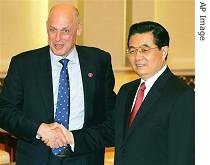2006年VOA标准英语-China, US Pledge to Remedy Trade Imbalance
搜索关注在线英语听力室公众号:tingroom,领取免费英语资料大礼包。
(单词翻译)
By Roger Wilkison
Beijing
15 December 2006
watch video report by Mil Arcega
The United States and China have agreed to try to redress1 imbalances in their economic relationship, which saw China achieve a $200 billion trade surplus last year. Top-level officials met for the past two days in Beijing, and the two countries reaffirmed their common interest in maintaining a stable economic relationship. But, as Roger Wilkison reports for VOA, they did not commit to a timetable, or specific pledges as to how they would deal with the strains that bedevil it.
 Henry Paulson left, is greeted by Chinese President Hu Jintao after closing of Strategic Economic Dialogue, 15 Dec. 2006 |
||
U.S. Treasury2 Secretary Henry Paulson is under pressure in the United States to go home with tangible3 results from his Beijing talks.
Some members of Congress and American business executives claim that China's currency, the yuan, is deliberately4 undervalued, allowing Chinese exporters to undercut U.S. companies in the U.S. market.
China has allowed the yuan to revalue since last year, but only within tightly controlled bands. China says it needs to continue fueling growth through exports, to keep tens-of-millions of workers employed.
Paulson and his Chinese counterpart, Vice5 Premier6 Wu Yi, acknowledged Friday that the two sides do not always see eye-to-eye on that issue and others, but will strive over the long term to improve the relationship.
Paulson told reporters, he and Wu had a good, productive discussion, but that only time would tell what concrete results will emerge from the talks.
"On the major issues, which we were talking about, many of them have to do with economic reform in China and the speed of that process," he said. "Where there is a difference, okay, is on the speed of that reform. We have a common interest in the right outcome, and we're differing about the best way to get to that outcome."
Paulson was accompanied on his trip to Beijing by several top Cabinet officials and by Ben Bernanke, the head of America's central bank, the Federal Reserve.
Bernanke, in a speech earlier Friday, also argued that China should allow market forces to determine the value of the yuan.
The discussions were part of a so-called "strategic economic dialogue" aimed at resolving long-term problems between the world's biggest economy and the world's fastest-growing economy.
The officials will meet again next May in Washington.




